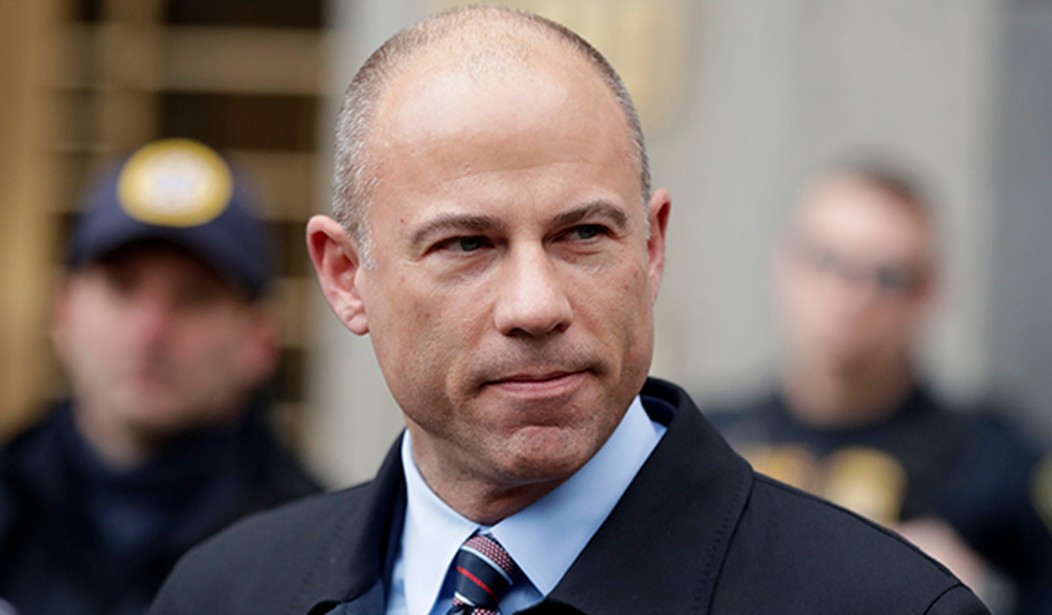In recent political memory, very few have had as spectacular and Luciferian fall from grace as television lawyer Michael Avenatti. There was something irreducibly sad in his latest interview on "Good Morning America." Gone was the characteristic braggadocio that he never feared to flaunt on national television when representing Stormy Daniels against the President of the United States, gone was his wry smile while basking in the praise of various media personalities. Although he appeared to feign confidence and refused to admit wrong doing, he did admit to a fear of going to jail for the rest of his life. “Of course I'm nervous,” he told CBS News’s Jericka Duncan. “I am nervous. I'm concerned. I'm scared. I feel terrible for my family. I feel bad for my friends.”
You might not like Avenatti. You might, like Tucker Carlson, despise the man to the point of exclusively referring to him as “the creepy porn lawyer.” But the adrenaline-junkie attorney’s meteoric rise and miraculous crash and burn illustrate a dangerous and alarming trend in political media: the setting up of talented people for a nasty implosion that could have otherwise been avoided.
True, no one made Avenatti do scores of television interviews in the span of a few months; no one forced him to take on high-profile clients with dubious legal cases against then-Supreme Court nominee Brett Kavanaugh, President Donald Trump, and his administration; no one forced him to extort Nike for millions of dollars and steal from his client in order to alleviate his legal and financial woes.
Like political print media, television shows do not pay their guests honoraria or other fees to appear on their platforms. The chance to be in the public eye is considered compensation enough and the equivalent of many thousands of dollars in advertising. Avenatti clearly benefitted from his many appearances: after representing Stormy Daniels, he went on to snap up retainer agreements with immigrants suing the Trump administration, a Kavanaugh accuser, and parents of children abused by singer R. Kelly.
Recommended
But all those television shows on CNN and MSNBC and all their producers decided to allow Avenatti nearly unlimited publicity merely because they saw him as a “fighter” who could bring down the big, bad bully in the White House. And once Avenatti had the taste of fame on his lips, he could no more stop himself from tumbling down a short road to infamy than an alcoholic could deny himself another drink. Most of us have to admit: were we in Avenatti’s position, we could have hardly saved ourselves from such a veritable self-immolation.
And made no mistake: Avenatti is only Exhibit B. Before Avenatti, there was Anthony Scaramucci, otherwise affectionately known as “the Mooch.” Scaramucci, too, was another big-shot led to the gallows by an enamored political media. They lavished on him such attention one would mistake them for having offered adoration to a god. It only took ten short days for Scaramucci, his phone likely ringing nonstop from calls from journalists, to slip up and make a few ill-chosen remarks. The man who bragged about firing everyone in the White House communications office was himself fired, and found his marriage on the rocks for many months thereafter.
And this begs the question: who is the next political superstar to fall? Who is the media’s next unwitting, self-submitting victim? Alexandria Ocasio-Cortez is undoubtedly the most likely candidate for implosion in the near future, owing to the inordinate amount of attention conservative media has lavished on her in particular. A recent poll has found Ocasio-Cortez extremely unpopular in America at large, and it is well-known that the freshman congresswoman is disliked by her political superiors for upending standard operating procedure in D.C. Anyone who livestreams their forays into cooking while discussing the incoming global warming apocalypse is bound to crack at some point…or at least misspeak, which is the quickest way to commit political suicide in the present, hypersensitive climate.
The golden rule in politics is never to interrupt your enemy while he’s making a mistake. Yet the virtue of charity dictates that we at least avoid letting our enemy completely destroy himself. His defeat on the political stage, not his personal destitution, is enough. In the absence of the love of one’s neighbor, politics ceases to be a mutual working-out of differences in search of the common good and instead descends into pure bloodsport.
The mainstream media, had they any sense of responsibility for the wellbeing not only of the public but also Avenatti, would have never let the man in front of a camera to begin with. Fools rush in wherever television producers allow them to tread.
Gavin Wax is President of The New York Young Republicans, former New York State director for the Ted Cruz presidential campaign, and former deputy political director for Nicole Malliotakis' New York City Mayoral campaign. His work has appeared in Townhall, The Daily Caller, The Hill, The Washington Examiner, The Federalist, and Newsmax. You can follow him on Twitter @GavinWax
























Join the conversation as a VIP Member